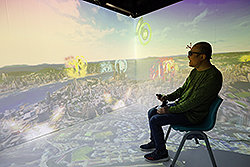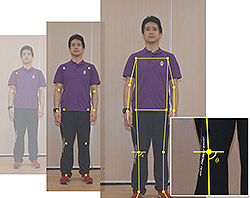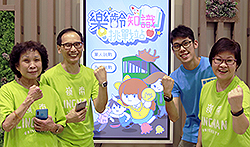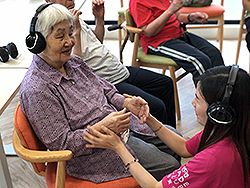|
Workshop I 25 November 2020 16:45–17:30
Title: Optimizing Management of Schizophrenia: An Update of Treatment Strategies
精神分裂症及藥物新知
|

|
Dr. Victor Wing-cheong Lui
Clinical Assistant Professor (Honorary)
The Chinese University of Hong Kong
Schizophrenia is a chronic, disabling, and relapsing psychiatric condition that has a significant impact on the quality of life of both patients and their caregivers. The antipsychotic treatment has been the mainstay treatment for schizophrenia since the 1950s. With the advance in technology, more treatment options are available, so that the clinical outcome can be optimized while the burden of patients and their caregivers can be minimized. This lecture will review various treatment options, including the latest second-generation long-acting injectables, and how these options improve the quality of life of patients and their caregivers.
|
|
|
Workshop II 26 November 2020 15:00–15:45
Title: Application of Technology to Enhance the Users’ Quality of Life in Residential and Community-based Rehabilitation Service
科技應用於院舍及社區復康服務以提升服務使用者的生活質素
|

|
Ms. Alice Leung & Ms. Connie Yiu
Assistant Superintendent
Tung Wah Group of Hospitals
Abstract
The population is getting older and we have to address the emerging changes arising from the problem of ageing. Gerontechnology therefore becomes a trend for general population as well as people with disabilities to alleviate the burden of carers as well as to increase the users’ independency. Rehabilitation plays an essential role in such an aspect to improve the functional abilities and to maximize the potential of our health declining clients. In enhancing the quality of life and promoting respect for the inherent dignity of our users in residential and community-based service, we have applied new technology in recent years. The application of Virtual Reality in rehabilitation training, 3D printing technology in fabricating of rehab aids, D3-bladder and intelligent fitness equipment in active aging and computerization of Central Drug Management System, are the milestone and strategic directions to the future development of rehabilitation service.
|
|
|
Workshop III 26 November 2020 16:15–17:00
Title: Use of Electronic Tablet Applications in Chronic Knee Pain Management for Seniors in the Community
不只是遊戲:長者膝痛管理計劃
|

|
George K.C. Wong
Senior Physiotherapist
Hong Kong Sheng Kung Hui Welfare Council Limited
Chronic knee pain, which may be consequential to degeneration, is one of the most common concerns and causes of disability of the elderly. With updates in healthcare knowledge, it is well-known that traditional medication can only achieve short-term symptom relief for degenerative knee pain. Intervention for degenerative knee pain nowadays does not focus solely on pain and physical disability, but also on the impacts to the elders in their various psychosocial aspects, which lead to negative impact on their social life circle and quality of life. Healthcare practitioners have adopted patient empowerment, weight control and regular exercise as the keys to successful chronic pain management.
However, even the benefits of exercise have been widely spread, the nurture of relevant exercise skills and the formation of a regular exercise habit for the elderly are always difficult to healthcare practitioner in the community. In recent years, incorporation of new technologies to assist and facilitate the practitioners in these aspects have received astonishing positive feedback. The choices vary from simple machinery device to giant complex robotic facility. In our “E-Generation Chronic Knee Pain Management Project for Senior”, instead of producing groundbreaking hardware from nothing, we made use of one of the most commonly used electronic product, even among senior citizens, the electronic mobile tablet, to achieve our purpose to promote chronic knee pain management. The combination of simple elements of game, exercise and electronic tablet applications gives us mind-blowing insight for our future practice in the community.
|
|
|
Workshop IV 27 November 2020 10:15–11:00
Title: Preparing Gerontechnology Ambassadors through a Knowledge Transfer Model: The Lingnan University’s Approach
以知識轉移模式培訓樂齡科技專員—嶺南大學的案例
|

|
Professor Joshua Ka-ho Mok
Vice-President
Lingnan University
With the nomination for the "HKSAR Chief Executive's Community Project List", The Hong Kong Jockey Club Charities Trust donated a three-year project (2019-2022) to Lingnan University. The Project named "LU Jockey Club Gerontechnology and Smart Ageing Project" aims to promote Gerontechnology and support smart aging Socialpreneurship development. This Project also serves as an educational platform to provide training courses and workshops on "Gerontechnology in Healthcare, Dining, Living and Transport". Baseline studies will be conducted to build a database in the areas of Gerontech products and services, social innovation, and startups, with a vision to offer policy recommendations to the industry and Government.
Lingnan University organizes the Gerontechnology Practitioner Training Course, as one of the major initiatives in the Project, to attract public interested on Gerontechnology, and raise public awareness about the Gerontechnology development, relevant policies and practice. By adopting the concepts of knowledge transfer, participants (including elderly and care-givers) will also be invited to be the ambassadors and participated in further knowledge transfer activities and various forms of outreach and community engagements. In addition, it also helps to promote the productive aging and age-friendly environment guided by the initiative of the Project.
In this workshop, the LU's project team, together with the ambassadors, will share tips about the knowledge transfer model and experiences of organizing the Gerontechnology Practitioner Training Course. The ambassadors will also share their views on the Gerontechnology and experiences on the impact on the aging society.
|
|
|
Workshop V 27 November 2020 11:30–12:15
Title: Silent Chair Dance for Dementia Patients – Experience a Reminisce Music and Dance Cognitive Training
智友‧快樂椅子舞—體驗懷舊歌舞的認知訓練
|

|
Dr. Patrick Cheung
Founder and Managing Director
The Jade Club Management Limited
The Jade Club is the leader in the field of developing and delivering active ageing programs with Fun, Exercise and Social elements in Hong Kong. Our flagship program- Happy Chair-based Dance is the first created, developed, offered to solve the physical and psychosocial suffering from elders in Hong Kong.
With the positive outcomes of elders who participated in Happy Chair-based Dance in past seven years, in 2020, we develop a new proprietary program designed for people with dementia — “Silent Chair Dance”, a reminisce music and dance program based on the silent disco concept with the use of wireless Bluetooth music controller technology. According to researchers, there is increasing evidence suggestion music can bring calm to people with dementia by reducing agitation and supporting those affected to cope better with symptoms. Dancing is also a form of exercise involves both a mental effort and social interaction and that this type of stimulation helped reduce the risk of dementia.
“Silent Chair Dance” is built on reminisce by playing old time or evergreen music, and elders’ familiar Cantonese songs. It helps with their cognitive ability, the two-way interaction make them feels alive and better mood. The uses of Bluetooth technology improve the level of engagement of people with dementia, as well as lower the barrier on program delivery. The sound system and wireless headsets help the participants to concentrate much on the music and instructor voice, it provides them an immersive experience in a social group sharing laughter together. It is suitable for elderly ranges from early onset to severe dementia, and in any physical condition including those who are wheelchair bound and bed bound.
|
|
|